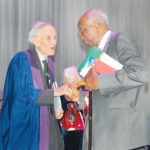It called on the government to review the legislation.
France had failed to make the case for its ban, the committee said, giving Paris 180 days to report back to say what actions it had taken.
The panel’s findings are not legally binding but could influence French courts.
“In particular, the committee was not persuaded by France’s claim that a ban on face covering was necessary and proportionate from a security standpoint or for attaining the goal of ‘living together’ in society,” it said on Tuesday.
The panel of 18 independent experts oversees compliance with the International Covenant on Civil and Political Rights. Implementation of its decisions is not mandatory, but under an optional protocol of the treaty, France has an international legal obligation to comply “in good faith.”
There was no immediate reaction from French authorities.
The same committee came to similar conclusions on the 2008 case of a woman sacked by a daycare for wearing a veil.
In September, a top French judge was quoted by newspaper, Le Monde, as saying that while not binding, the panel’s decisions might still influence French case law.
In 2014, the European Court of Human Rights, whose rulings are binding, upheld France’s ban on full-face veils in public, saying it did not violate religious freedom.
But the UN Human Rights Committee disagreed with this in its statement on Tuesday, saying the ban disproportionately harmed the right of women to manifest their religious beliefs and could lead to them being confined at home and marginalized.
The committee’s findings come after complaints by two French women convicted in 2012 under a 2010 law stipulating that “No one may, in a public space, wear any article of clothing intended to conceal the face.”
Under the ban, anyone wearing the full-face veil in public is liable to a fine of 150 Euros or lessons in French citizenship.
The committee’s chair, Yuval Shany, said that he and several others on the 18-member panel considered it a form of oppression.
Human rights organisation, Amnesty International, criticised the ban, describing it as a violation of the freedom of expression of women who chose to wear a veil.
In a related development, Algerian authorities have banned female public sector employees from wearing full-face veils, or niqabs, at work.
Prime Minister Ahmed Ouayhia publicised the decision in a letter to ministers and regional governors in the Muslim-majority country.
Civil servants, he wrote, need to “observe the rules and requirements of security and communication within their department.”
He said public sector workers needed to be able to be “physically identifiable” while in the workplace.
The ban has been met with both positive and negative reactions on social media, with some hailing it as progressive while others called it an attempt to control women and what they choose to wear.
According to Arabic newspaper, Asharq Al-Awsat, the ban was blasted by a Member of Parliament as a “declared war on Islam.”
However, another MP, Adda Fellahi, declared his support for the new law, saying the niqab is “a social and jurisprudence issue and has nothing to do with decency and chastity,” according to Asharq Al-Awsat.
Algeria has been split between moderate and more radical forms of Islam since it was plunged into years of civil war in 1992 when a military-backed government cancelled elections that an Islamic party was poised to win.
Most Algerian women do not wear the niqab, a custom imported from more traditionally conservative Arab countries such as Saudi Arabia but the decision is likely to be criticised by Algeria’s Salafists minority.
The Salafists endorse Saudi’s strict Wahhabi version of Sunni Islam and oppose the more mainstream Sufi Islam that dominates Algeria and other North African countries.






